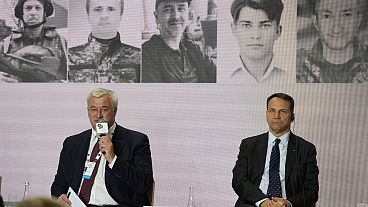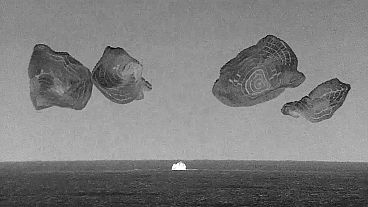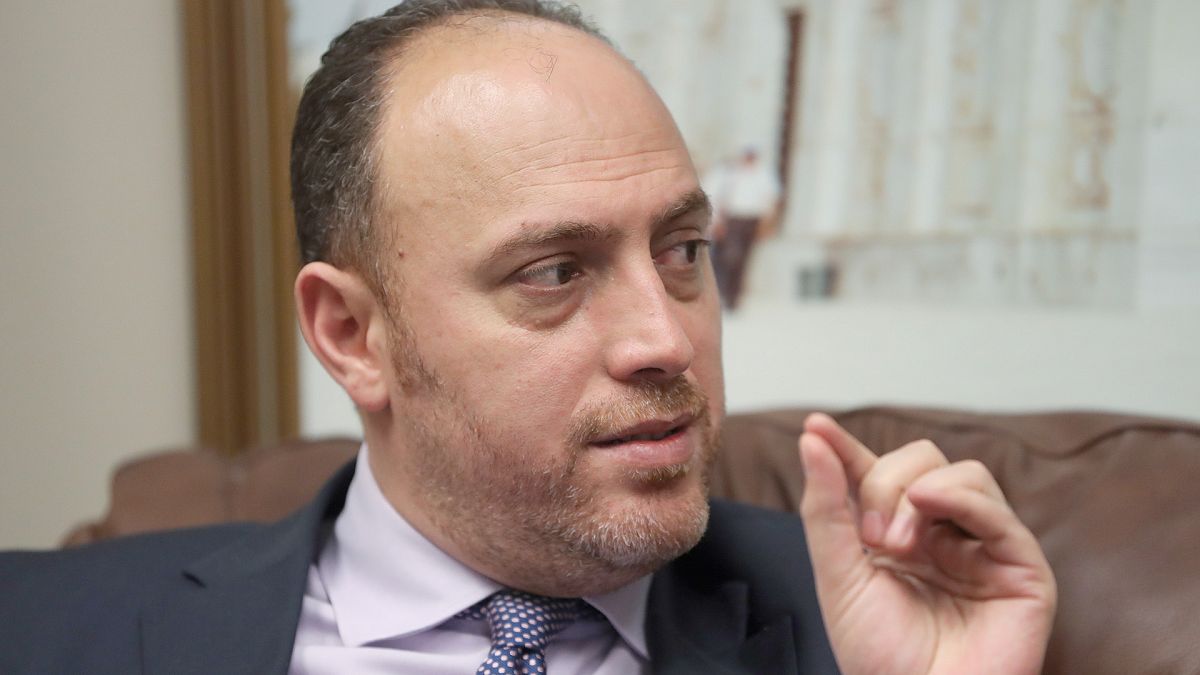Palestinian envoy to the UK Husam Zomlot spoke to Euronews Turkish on a number of pressing issues, including the EU and UK's relations with Palestine and the Gaza crisis.
The European Union needs to respect the International Court of Justice (ICJ) in its policy on Israel and Palestine, the Palestinian envoy to the UK said in an exclusive interview for Euronews Turkish.
Husam Zomlot explained that the EU is a key factor in ending the ongoing Israel-Hamas conflict, which is why " the ICJ ruling is a historic and vital decision. In particular, the EU needs to form its policies according to the ICJ ruling."
The court ruled in July that Israel's presence in the occupied Palestinian territories, including the Gaza Strip and the West Bank, is illegal, asking Israel to withdraw its troops and dismantle its settlements.
If the EU doesn't react and demand the same, this might spark another refugee crisis for the continent.
"Europe is a region that is geographically close to Palestine," he pointed out, emphasising that it is one of the reasons why "Europe needs to reach a clear, consistent and coordinated consensus in the face of this situation."
"It is gratifying that the European Council is discussing the imposition of sanctions on (Israeli Finance Minister Bezalel) Smotrich and (National Security Minister Itamar) Ben-Gvir. However, sanctions need to be applied not only to these two extremists but to all (those behind) illegal behaviour."
British promises
The UK must play a key role in ending the war between Hamas and Israel that began with the attacks of 7 October of last year, Zomlot added, pointing out that the UK's still-new Labour government has pledged to formally recognise the Palestinian state.
Zomlot said he and other Palestinian Authority officials have held regular meetings with the UK Foreign Office, reiterating that recognition should come as soon as possible and that promises should be kept.
"They say it's a matter of timing," he said of the talks. "We tell them the time is now. Otherwise, they are not serious about the two-state solution and the promise of recognition."
Noting that they last met on Thursday, Zomlot expressed satisfaction with the new government's stance compared to the previous UK government, though he acknowledged "there is still a long way to go".
Zomlot said the pressure on Israel to end the conflict must be made more intense.
"The only reason we have not been able to reach a ceasefire agreement so far is because of (Israeli Prime Minister Benjamin) Netanyahu," he said. "The UK should play a key role in putting pressure on them."
Netanyahu's apparent unwillingness to agree to a peace deal has been criticised by Israel's opposition, while it also sparked recent protests and calls for a nationwide strike in light of news of further Israeli hostages found dead in Gaza.
Hamas' future in Gaza
Asked why the US and Israel ultimately do not want Hamas to retain its presence in Gaza, Zomlot, the former envoy to Washington, explained that unity is fundamental to future Palestinian autonomy and statehood, which will require a governing authority respected by all actors.
"The only formula is to have a single Palestinian government that meets the needs of our people living in Gaza, the West Bank and Jerusalem and cares for them," he explained.
"Only a single central legitimate government can provide this. And we have a government. Our president (Mahmoud Abbas) announced an action plan in Turkey and is working to implement this action plan by going to Gaza. So the issue is not about political groups there or here."
When asked whether this situation means Hamas will be part of a Palestinian state in the future, Zomlot said, "The agreement reached so far among all groups is that any current or future government will be a single government, but it will be made up of technocrats, not political groups."
"We need professionals and technocrats to begin the major task of meeting the needs of the Palestinian people, especially in Gaza and in the West Bank, and of reconstruction and development."
"In this way, there will be no political factions in the government," he explained.
Who will sign the ceasefire?
With the mediation of the US, Qatar and Egypt, Hamas and Israel have spent months sporadically negotiating around the ceasefire proposal prepared and proposed by US President Joe Biden.
Although there have been sporadic reports in recent months that a ceasefire is imminent, the talks held in August in Doha and Cairo have so far been fruitless.
The lack of a Palestinian state presents a legal complication for any ceasefire deal with a binding plan for Gaza's future.
While Israel can participate as a full-fledged state, the only internationally legitimate organisation within the Palestinian territories is the Palestine Liberation Organisation, which is recognised by many countries but does not govern Gaza.
Now it's down to the Israeli PM to say yes, Zomlot said. "There is a UNSC resolution that provides a clear roadmap for the stages of the ceasefire. We have a ceasefire preparation in hand, but the only missing part is Netanyahu."
"The ceasefire negotiations can only be concluded if the international community can convince the Israeli government. This can only happen through pressure, sanctions and an arms embargo," he concluded.












